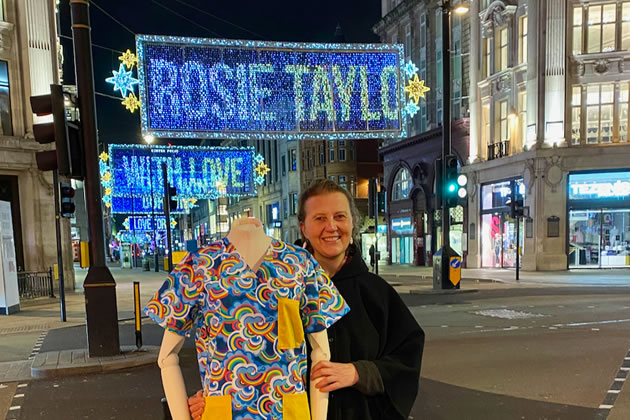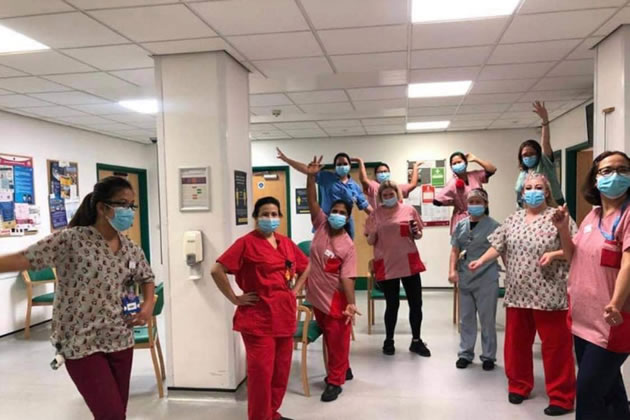Local Hero Gets Her Name in Lights on Oxford Street
Rosie from the Scrubbery selected because of her work during the pandemic

Rosie on Oxford Street with her name in lights
A woman who has worked to provide fashionable and functional scrubs for health workers during the pandemic had her name in lights this Christmas.
Rosie Taylor-Davies from the Scrubbery was nominated as a hero of 2020, and of all the nominees she was selected as one of the handful to have her name in the Christmas lights in Oxford Street.
Born in New Zealand she travelled across to the UK aged 21, and studied Garment Production and Design at the London College of Fashion, and Fashion Illustration at Central St Martins. She has since worked in costume for theatre, film and television, been in charge of the commercial studio at the Royal School of Needlework, and many other roles in commercial and bespoke garment production. Her specialism is history of dress and embroidery; knowledge that she applies practically to art installation for museums and mounting for exhibition. Ultimately when the world returns to some sort of normality, Rosie would like return to her PhD research on the eighteenth-century embroidery trade in London.
In January 2020, as a result of her daughter being a junior doctor and listening to the news from around the world, Rosie was alerted to and worried by the potential crisis looming regarding Covid 19. On 23 January, as Wuhan locked down, she was talking to a friend in New Zealand who said he was concerned about the virus coming there and it occurred to Rosie then that the UK was equally at risk. She was already looking at the issue of adequate scrub provision, alerted by the problems her daughter had in getting scrubs of the right size and fit. Rosie researched scrub design and solicited junior doctors for their input. She then designed a pattern for scrubs as simple as possible to construct and also to meet changed requirements. The scrubs have no pockets on the back trouser but instead two patch pockets on the front large enough to fit a phone and able to hold up to 5 pagers at any one time. The trouser pockets have a small opening so that locker keys don’t fall out. The top has 2 hip pockets and a breast pocket, side vents and a V-neck yoke. In other words she made a design that was fit for purpose, based on what medics actually needed. This is the pattern used at the Scrubbery.

Health workers show off their scrubs supplied by the Scrubbery
Only A&E and Surgery units (about 20% of hospital staff) usually wear scrubs, and now most would need them, therefore there was going to be a massive spike in demand that probably could not be fulfilled. In February she asked Bernie, the bookings manager at her church. St Mary’s in Putney, if they could use the facilities there to cut out and make scrubs. She created pattern templates in card on the floor in the Lancaster Hall at, Putney.
She researched which industrial cutter would work best, where to get it from to ensure customer support going forward, researched cloth suppliers, as well as funding the first cloth purchase. The fledgling Scrubbery was setup as a charity under the charitable arm of Parish Action in the Parish of Putney. Rosie’s “bubble”, Christopher, Raphael and Alex, all came to do the first lay, cutting and bundling of kits. By the beginning of March 2020 Rosie was more or less permanently installed in the church, continuing to cut on her hands and knees for the next 5 months.
Using social media and personal contacts Rosie reached out to the parishioners of Putney, the Rotary Club and Women’s Institute, and For the Love of Scrubs, from which a team of volunteers assembled, and a manufacturing operation began to emerge. One of the most stalwart supporters, Tracey, even stumbled upon the Scrubbery by accident and stayed to help.
Rosie found the time to become the National Co-Ordinator of Scrubs for St George's University Hospital Trust, and the Royal Brompton and Harefield NHS Hospital Trust. She had contact with The Royal Hospital for Neuro Disability and Kings College Hospital; Genevieve (Rosie’s daughter) and Jack (Genevieve’s now husband) also helped to spread the word within the hospitals they were seconded to. Over 18,000 items, including sets of scrubs, face masks, laundry bags and gowns have been supplied, enabling so many hospitals and medical personnel to be protected in the first wave of the pandemic, and now they continue on with the second.
The Scrubbery was contacted by Primary Care Network Wandsworth, because they are in the process of setting up GP-led Hot Hubs across the borough – to diagnose and triage coronavirus (Covid-19) patients who are not in hospital. Some Hubs are at GP surgeries and others are borough wide. They offer daytime, evening and weekend sessions. These Hubs are in the main staffed by GP practices in the borough. Additionally, not all the people making the assessments would have traditionally had sets of scrubs – so hence an immediate need that The Scrubbery has helped to fulfil.
They are also working with the mushrooming Vaccine Clinics that come under the Wandsworth GP Federation – there are 6 of these clinics with more in the pipeline (9 in total for January). For them they have supplied 220 sets of scrubs so far for the 6 operational clinics.
Fleur Anderson came by the Scrub Hub before Christmas to offer her continued support – emotional and practical. They say they are indebted to her for her ongoing interest and guidance. She is still working with Rosie to set up a meeting with the Government Procurement Department to find a sustainable way of making scrubs in the UK.
Sarah Illić from West London Kidney Patients’ Association said, “We were thrilled that The Scrubbery were able and willing to help us get these orders fulfilled by supplying fabric and the help of their volunteers and without them it would not have been possible and we will be making a donation to cover the cost of the fabric and threads etc. The nurses were grateful for the scrubs and looked fabulous in them. [The Scrubbery] did a wonderful job of keeping tabs on the ever increasing requests and made some lovely outfits with their mix and match.”
They are starting a new initiative at the Scrubbery, having heard that morale amongst overstretched staff in hospitals is low. They would like to make up some well-being packs of goodies nestled in Scrubbery-made drawstring bags. For those of you who don’t sew but would love to help they are accepting donations of quality items suitable for these packs. The need is great, St. George’s University Hospital are already giving out about 100 packs a week across their sites and they would like to target a number of the other hospital trusts they work with. Individual donations welcome but they are also looking for people with corporate or business contacts to help with the volume needed.
Examples of small luxury items (for men and women) include:
Handwritten thank you cards
Small boxes of chocolates
Face cream
Hand cream
Selection of teas or coffees, reusable "Keep" cups
Luxury toiletries – bath and shower gel, bath bombs, face masks, foot masks etc
Vouchers
Small scented candles
Deliveries to the Scrubbery at the Bank of England Sports Centre in Roehampton by appointment. Address any queries to scrubbery.stitch@gmail.com
Click this link to find out more information about how to help financially.
January 29, 2021
Related links
|